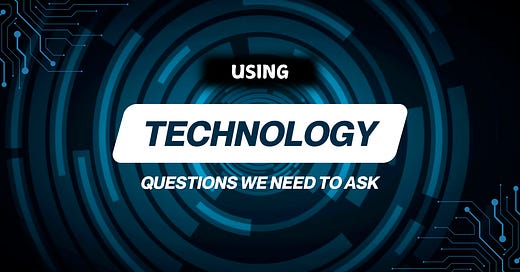Questioning Technology
A list of questions we should ask (before use and purchase) when evaluating a particular technology.
“Technology is a useful servant but a terrifying master.”
One of the pervasive myths out there among educators is that “technology is neutral”.
What is commonly meant by this, is that technology in/of itself does nothing to us, our world - rather it is how we use it that creates benefits or problems.
It definitely is a good massage but not true at all. Like McCluhan related, we create and shape technology then the technology creates and shapes us. There are many implications involved with using a technology and educators should think hard and slow about adopting a particular form of technology (a tool).
Typically schools use a Technology Integration Matrix and then ask a series of standard questions about the technology. Such as;
Does the technology align with educational goals and outcomes?
Does the technology meet accessibility and use requirements?
Is the technology clear, easy to use and navigate? (color, text, layout, instructions, language options, help etc …)
Does the technology allow for customization and administrator control?
Does the technology integrate with other technologies?
Does the technology allow for editing, localization and personalization of content?
The questions are obvious really … but they are sorely lacking in the fundamental things we should be asking about adoption of a technology as part of the learning process.

Today, I sat down and wrote out some different questions I’d ask, if I were about to adopt a technology at my school or even just in my class. Hopefully some of these will resonate with educators, and get us critically evaluating technology.
Too often, it is just us reacting to the flashy, hyped lights technology blinds us with. Let’s be more critical when using technology - there are other agendas at work, other affects. Download the list as a PDF »»
Technology is never a neutral thing.
What are the effects of this technology on our environment, sustainability?
What are the affordances of this technology, what can we do with it?
What alternatives exist to this technology that do the same thing?
How much does this technology cost? How locked in will I be to it?
If free, how long will this technology remain free? How locked in will I be?
How does this technology protect my identity and the personal data of my students?
Is there a person available I can talk to, that is knowledgeable about the technology? Or will I get lost in an unresponsive wormhole of deflection?
How does this technology respect the intellectual property of others?
How does this technology view knowledge and its role, its place in the world?
What are the moral and future implications of using this technology? Where is it taking us, what kind of world is it creating for us?
What kind of person will the use of this technology turn me into?
What habits will the use of this technology instill? How addictive is it? How dependent will it make me?
How will the use of this technology affect my experience of time?
How will the use of this technology affect my experience of space and place?
How will the use of this technology affect my experience of other people, my relationships?
How will the use of this technology affect how I teach and relate to my students?
How will the use of this technology affect how I relate to the world around me?
What good or bad practices will the use of this technology cultivate?
What good or bad practices will the use of this technology displace?
What will the use of this technology encourage me to notice, to be aware of what is true, good, noble?
What will the use of this technology encourage me to ignore, be blind to?




